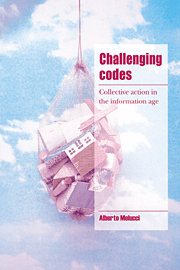Book contents
- Frontmatter
- Contents
- Preface and acknowledgements
- Introduction
- Part I Theory of collective action
- Part II Contemporary collective action
- 5 Conflicts of culture
- 6 Invention of the present
- 7 The time of difference
- 8 Roots for today and for tomorrow
- 9 A search for ethics
- 10 Information, power, domination
- Part III The field of collective action
- Part IV Acting collectively
- References
- Index
6 - Invention of the present
Published online by Cambridge University Press: 23 November 2009
- Frontmatter
- Contents
- Preface and acknowledgements
- Introduction
- Part I Theory of collective action
- Part II Contemporary collective action
- 5 Conflicts of culture
- 6 Invention of the present
- 7 The time of difference
- 8 Roots for today and for tomorrow
- 9 A search for ethics
- 10 Information, power, domination
- Part III The field of collective action
- Part IV Acting collectively
- References
- Index
Summary
Being young: choice or destiny?
Why is there a ‘youth question’? Why has there developed a particular interest in studying young people? The answer, in terms of the sociology of knowledge, is relatively simple: young people are recurrently involved in forms of conflictual action, and for this reason an investigation of their condition is a frequent concern of sociologists, psychologists, anthropologists. In what follows, I want to challenge the line of analysis investigating a condition in order to explain an action. The way the issue of youth in contemporary societies is engaged exemplifies the procedure that is frequently used in addressing the theoretical problem of social movements in general. Once the presence of collective action has been ascertained, analysts move on to an examination of the social condition of a specific social category (in this case, young people) in order to deduce from this the causes of its action. Collective action is never studied on its own; it is discounted as a meaningful object of investigation, and related to the ‘structural’ or ‘cultural’ determinants of the social condition of the actor involved. The case of young people, like that of women, provides a good illustration of the procedure. Analysis of the condition of youth or women may be an important element in the description of contemporary social structure, but by itself it tells us nothing about their action.
- Type
- Chapter
- Information
- Challenging CodesCollective Action in the Information Age, pp. 118 - 132Publisher: Cambridge University PressPrint publication year: 1996

